#Mickey (himself) McGuire
Text
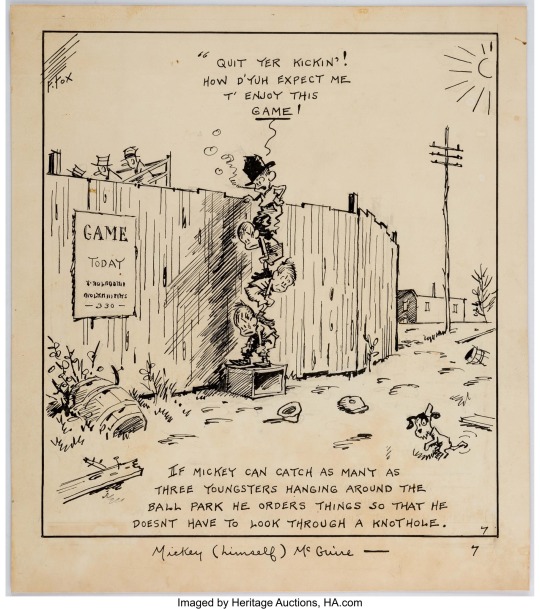
Fontaine Fox “Mickey (himself) McGuire” Toonerville Folks Daily Comic Strip Original Art (McNaught Syndicate, undated)
5 notes
·
View notes
Photo

[image description: An ink and wash illustration in the form of a New Yorker cover. A middle aged middle-American in a white polo shirt, brown sport jacket, brown belt, and green golfing pants. He wears a red ball cap (made in China, natch) on his floating question mark of a head and holds a cell phone in one of their Mickey Mouse white-gloved hands. Text reads, “Number 82, QANON ~ SMALL GOD OF APOPHENIA”]
He is a tempting god. He calls from the shadows, offering a world that makes sense, offering a delicate yet immutable weave of claims and connections, a chance to render reality comprehensible in a way that few others can match. The human mind is drawn to story, after all. We like the rising action, the narrative connection. We like each act to be distinct and succinct and complete.
He can offer that. He understands human nature on a level few can match and fewer still would aspire to, for he understands something that is better off left in the apocrypha. He understands the means and the making of gods.
He turned himself into one, after all.
It began simple and small: a few connections drawn between terrible things, a dash of justification, a pinch of magical thinking, all combined into a draught of horrors. As more and more drank from his cup, he was able to make it larger, to add more ingredients and season them just so as to keep them all connected. Past a certain point, his witch’s brew no longer demanded any unity, any logic; all that mattered was that a thing be added to the mix, and it would be accepted by those who came to drink.
And then one day, he realized he was no longer adding anything at all, and the cup still did not run dry; the brew had become self-replenishing, and his first act of divinity was complete.
He can make it all make sense. He can make the day you were born correspond with the day you will die; he can make it fit together in a sweet and seamless whole, perfect and complete. He can take the loose edges away. All you have to do is open up the door and let him in.
All you have to do is give in to temptation, and drink.
We beg you to abstain.
....................
Join Lee Moyer (Icon) and Seanan McGuire (Story) Monday, Wednesday, and Friday for a guide to the many small deities who manage our modern world, from the God of Social Distancing to the God of Finding a Parking Space.
Tumblr: https://smallgodseries.tumblr.com
Twitter: https://twitter.com/smallgodseries
Instagram: https://instagram.com/smallgodseries/
Homepage: http://smallgodseries.com
169 notes
·
View notes
Link
September 29, 2021
By Mike Barnes
(The Hollywood Reporter) — Tommy Kirk, whose career as a young leading man in Disney films like Old Yeller, The Shaggy Dog and Son of Flubber came to an end, he said, after the studio discovered he was gay, has died. He was 79.
Kirk lived alone in Las Vegas and was found dead Tuesday, actor Paul Petersen announced on Facebook. TMZ reported that he died at home, and no foul play is suspected.
Kirk first made his mark starring as sleuth Joe Hardy in a pair of Hardy Boys TV serials, “The Mystery of the Applegate Treasure” and “The Mystery of the Ghost Farm,” offshoots of ABC’s The Mickey Mouse Club that aired in 1956-57.
He also played the middle son, Ernst, in Swiss Family Robinson (1960) — James MacArthur and Kevin Corcoran were his brothers and John Mills and Dorothy McGuire his parents — and starred as college brainiac Merlin Jones opposite Annette Funicello in two more Disney movies.
Kirk brought many a tear to movie audiences’ eyes starring as country kid Travis Coates alongside a heroic Labrador retriever in Old Yeller (1957), then turned into a pooch himself — a sheepdog named Chiffonn — in The Shaggy Dog (1959), the first of four movies he made with Fred MacMurray...
... Talking about Old Yeller, film historian Leonard Maltin said, “One of the reasons people remember [the film] is not just the fate of a beloved dog, but the shattering grief expressed by his owner, so beautifully played by Tommy. I think his talent and range as an actor were taken for granted somewhat. He was really very versatile”...
On Facebook, Petersen — the Donna Reed Show star who launched the support group A Minor Consideration to lend a hand to former kid actors like himself — noted that Kirk was “estranged from what remains of his blood-family.”
“Please know that Tommy Kirk loved you, his fans,” he added. “You lifted him up when an Industry let him down in 1965. He was not bitter. His church comforted him. May God have mercy on his soul.”
#Tommy Kirk#Old Yeller#The Shaggy Dog#Son of Flubber#The Mickey Mouse Club#Swiss Family Robinson#The Misadventures of Merlin Jones#Disney#obituary#The Hollywood Reporter#there's a piece on his death on D23's (the official Disney fan club) site that is a complete whitewashing of the studio's treatment of Kirk#that said his was always a welcome face in the handful of his Disney movies I've seen#this article also omits that Kirk was personally fired by Walt himself when the studio discovered he was gay
8 notes
·
View notes
Text
Larger Than Life
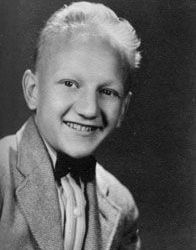
In 1927, Albert Bertanzetti and his three-year-old son, William, were taking a stroll when they stopped to join a small crowd watching a film being shot on the streets of Los Angeles. During a break in the shoot, Albert suggested his son go show the director, Jules White, his little trick. So William toddled over to White and tugged on his pant leg. When he had White’s attention, William flipped over, went into a headstand and began spinning in circles. White was so taken with the trick he gave the young Bertanzetti a small uncredited role in the two-reel short, Wedded Blisters. Afterward, William earned a regular role in the popular Mickey McGuire series of shorts, where he played Mickey Rooney’s younger brother Billy. Taking prevailing anti-Italian sentiments into consideration, in the credits he was cited as “Billy Barty.”
Barty had been born in Millsboro, Pennsylvania in 1924, but when it was determined he had hay fever, Albert decided to move the family West, to the dry, clean air of Hollywood. Depending on how you look at it, hay fever was the least of Barty’s problems. Or maybe not, given how things worked out.
Apart from hay fever, Barty had also been born with cartilage–hair hypoplasia, a form of dwarfism. Being extremely small for his age at three (as an adult he stood three-foot-nine), when it came to early film roles he was almost exclusively relegated to playing diaper clad infants. It was a director’s dream—having an infant on set who could not only take direction, but could walk, run, talk and do tricks as well. As a result, along with the Mickey McGuire shorts, he played infants in everything from the all-star live action adaptation of Alice in Wonderland (1933) to Golddiggers of 1933 (1933) to Bride of Frankenstein (1935). In fact Barty, tiny as he was, would play diaper-clad infants until he hit puberty.
Over a career that would span seven decades, along with infants, Barty would play his share of elves, leprechauns, imps, Hobbits, trolls, assorted other fairy tale and fantasy characters, clowns, court jesters, pygmies, sideshow performers and mad scientist assistants. Ironically, for having appeared in over two hundred films and television shows, Barty did not appear in the three touchstones of American Dwarf-centric cinema: Tod Browning’s Freaks (1932), Sam Newfield’s The Terror of Tiny Town (1938), or Mervin LeRoy’s The Wizard of Oz (1939). No, although he would appear in the behind-the-scenes comedy Under the Rainbow (1981), contrary to the general assumption, Billy Barty was never an original Munchkin. There are reasons for this.
In 1932 when Browning was working on Freaks, Barty was only eight, he was not a professional carnival freak, and he was too busy with the Mickey McGuire shorts. And after the shorts’ seven-year run ended in 1934—two years before casting began on Tiny Town or The Wizard of Oz—Albert Bertanzetti, recognizing talent in all of his children, pulled Billy out of the movies and sent the whole family on the vaudeville circuit.

Now, 1935 was hardly the most opportune time to try and break into vaudeville. As an entertainment form it had been on life support for a decade already, with theaters either closing down or becoming movie palaces with performances, almost as a sad afterthought, taking place after that evening’s double feature had ended. Those performers who could were trying to break into pictures, and those who couldn’t were vanishing without a trace. Now here was Barty, who’d been working regularly in films for nearly ten years, trying to break into vaudeville. Nevertheless, Billy and Sisters, as they were touted, marched on, with a musical act featuring Barty’s sister Evelyn on piano and accordion, his other sister Dede playing violin, and Barty himself on drums. They all sang and danced a little, and the adolescent Barty told jokes and did impressions. In his later years he remembered the time fondly, mostly because it gave him a chance at that early age to see much of North America.
In 1942 Barty enrolled in college in Los Angeles and majored in journalism, hoping to become a sportswriter. While there, he joined the football and basketball teams, where he was both a novelty and a ringer. He also played second base on a semi-professional baseball team for a spell, where by his own account he was walked forty-five times.
Instead of pursuing work as a sports columnist after graduation, he returned to show business. Later he was quoted as saying, “You don’t see any little people doing newscasts, you don’t see any doing sports writing, you don’t see any sports announcing, you don’t see any coaches, but there are little people who are capable of doing these things, who have proven themselves.” You get the sense there was a little personal bitterness there, hinting he may have been forced back to Hollywood because that was the only place he could find work.
By 1947, now an adult with a gravelly but high-pitched voice, Barty sported a boxer’s face on a disproportionately large head. In many ways he resembled a diminutive William Demarest, and in many roles would adopt Demarest’s gruff but lovable demeanor. Shedding the diaper at last, he nevertheless picked up where he left off, playing assorted pygmies and leprechauns and elves, usually for cheap laughs.
In the early Fifties he became a regular member of Spike Jones musical comedy ensemble, The City Slickers, and was a big hit on Jones TV shows, where he became especially known for his slapstick, spot-on Liberace impression, and his ability to roll off his piano bench into a head spin, a trick which continued to serve him well.

Growing up, Barty said, he had no idea he was different, that his parents never told him there were things he couldn’t do because he was too short. By the time he was thirty, however, he’d come to learn the rest of the world was not quite as accepting as his parents. In 1957, Barty put out a call for little people from around the country to join him for a get together in Reno. Only twenty people showed up to that first convention, but it became the foundation for Little People of America, a support and advocacy group pushing for equitable treatment and civil rights for dwarfs, midgets and other people of unusually small stature. His aim was to ensure little people across the country would be treated fairly, would be able to get jobs, and would be granted the same accessibility rights afforded the normally-sized. It always struck me as a little odd that, for all his tireless efforts lobbying to normalize perceptions and treatment of little people throughout American culture, Barty, without much apparent gumption, would continue to take roles some might call demeaning, or at the very least helped cement those stereotypes he was fighting so hard to break. Perhaps to him it was simply paying work, it was showbiz, and he knew full well what his role was within that world. But the apparent ironic contrast between his activism and his work would lead to a public tiff in the Seventies with fellow small actor Hervé Villechaize of Fantasy Island. Barty, who’d appeared on the show, felt Villechaize was undercutting all his work when he said bluntly that people like him and Barty “were midgets, not actors.”
After the second annual Little People of America convention, Barty began courting Shirley Bolingbroke, a little person who had attended the meeting. When he proposed, however, she declined, telling him she was a devout Mormon, and so would never consider marrying anyone outside the faith. In 1962 Barty relented and converted to the church of Latter-day Saints, and the two were married. Although Mormon insiders and publicists have made a big deal of Barty’s enthusiastic True Believer status within LDS, it would be many years before he agreed to get baptized and receive full member status, and then only to participate in his son’s baptism.
Around the time of the marriage, as Barty was making regular TV appearances on various comedy and variety shows (including a recurring role on Peter Gunn), he also began hosting a weekday afternoon local kid’s show in Los Angeles which was called either Billy Barty’s Big Top or Billy Barty’s Big Show, depending on who’s doing the remembering. That stint may well have brought him to the attention of the sinister Sid and Marty Krofft, who in the late Sixties conscripted Barty to become a regular on several Krofft shows including H.R. Pufnstuf, The Bugaloos, and later Sigmund The Sea Monster, where he played the titular sea monster opposite Rip Taylor and aging child star Johnny Whittaker.
For all the low-brow antics and his uncredited roles in Elvis movies, it must be said Barty was always a compelling and charismatic screen presence, a, yes, larger than life character. In those few rare instances when he played roles that made no references at all to his height—like Abe Kusich, the shady drunken cockfighter in Day of the Locust or Ludwig, Rod Steiger’s sidekick in W.C. Fields and Me, he proved himself an electric onscreen presence who could dominate any scene.
(Just a quick aside, in 1980 Ralph Bakshi rotoscoped Barty to portray both Bilbo and Samwise Baggins in his animated version of Lord of the Rings. I wasn’t aware of that at the time, but thinking back on it now, the way both characters moved, it seems so obvious I was watching another Billy Barty performance.)
In 1975, around the same time he opened a Southern California roller rink he called “Billy Barty’s Roller Fantasy, Barty established The Billy Barty Foundation. As an adjunct to Little People of America, the Foundation aimed to provide practical assistance—money, adaptive equipment, etc.—to little people in need, particularly children. And after campaigning for George H.W. Bush during the 1988 presidential campaign, he sat on a panel of advisors working to hammer out the details of the Americans with Disabilities Act, which President Bush signed into law in 1990.
At the same time he was sitting on that panel, Barty was also producing, directing and starring in Short Ribs, a syndicated sketch comedy series featuring an all-dwarf cast including Patty Maloney, Jimmy Briscoe and Joe Gieb. The show, which was modeled after SCTV and SNL, only aired in the Los Angeles area and ran thirteen weeks. After the show went off the air, Barty was slapped with two lawsuits, one from the show’s co-producer William Winckler and one from the show’s co-writer Warren Taylor, both of whom claimed Barty owed them money. The suits ended up, inevitably, in small claims court. Barty lost both suits, and even though few people had ever heard of, let alone seen the show, news of Barty in small claims court was too much for reporters to resist, and the case received smirking national attention.
After the suits were settled, Barty continued to work, but a bit more sporadically. He had one-off roles on Frasier, Jack’s Place, and a few low-budget quickies, and seemed to be edging more into voice roles, providing characterizations for a Batman cartoon and The Rescuers Down Under, to name a couple. But he was still working until the end, when he ended up in the hospital with cardiopulmonary issues in late 2000. He died on December 23rd of that year at age 73.
In the late Eighties he told an interviewer, “I’ve never looked at acting as ‘Ahhh!’ and ‘Gee!’ I started in vaudeville when I was five and for me it was just walking on a stage and I’m gonna perform. Later on I was impressed by many things, like when I worked with Burt Lancaster and Kirk Douglas in Tough Guys. That was an ‘Ahhh!’ for me. When I look back, even today, I guess I can go ‘Ahhh!’ because I worked with Ruby Keeler and Dick Powell in Gold Diggers of 1933 when I was nine. Then they were just grown-ups on the stage. As I look back, I’m more awed now than I was when I was actually doing it.”
Those who knew and worked with Barty always recall what a joy it was, how kind and enthusiastic and funny he was, a real spark who could enliven even the most questionable production. I would never deny that. I’ve always loved and admired Barty, and have sat through countless godawful films and TV shows simply because he had a role, no matter how small.
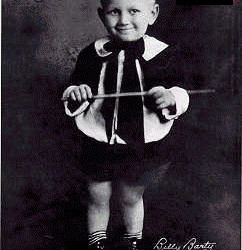
That said, I do have to wonder if at the end, after all his decades of work fighting for the dignity of little people everywhere, he felt like a bit of a hypocrite for spending those same years and more cementing the stereotype in the American consciousness. I also wonder if he died still wishing he’d become a sportswriter for a Des Moines daily instead.
by Jim Knipfel
7 notes
·
View notes
Text
alrighty @scottspack here i am to show my ass
top 10 ships tag! these aren’t “in order” but #1 is #1
1. cory and topanga! (boy meets world) my very first thought when given this prompt, theyre the blueprint! they are just BABIEs when they meet and they already Know each other. i will not pretend that topanga didnt shape me into the kind of girl who wouldnt change one thing about herself for a boy, keep your legs hairy and your convictions strong! the way they grow together is enough to make me hate god for not giving ME a cory matthews. high school ski trip infidelity aside, theyre the first couple that made me think i could find a man. i was wrong but its nice to think about.
2. kim possible and ron stoppable... the way the entire series is about kim being a wildly competent type A cheerleader AND teenage vigilante super spy and ron is her chilled out lame best friend who is Always there to help her save the day... please take a moment to listen to the jesse mccartney song why don’t you kiss her? that plays during the romantic climax of the kim possible movie, perfectly capturing the intense fear that comes with thinking about maybe finally kissing your best friend from preschool at your junior prom.
3. tami and coach eric taylor (friday night lights) ...come on, y’all!!!! genuinely the most real relationship i have ever seen on screen. i don’t even know what to say other than that they are REAL. coach and tami are such a good couple that it doesn’t make any sense to me that their kid would have such a massive stick up her ass. i even tried an ‘empathize with julie’ rewatch, and while a lot of her teen angst is understandable and even relatable, she still seems so disconnected from her parents/dillon at the end of the show in a very unsatisfying way! coach and tami are the heart of fnl. and tim riggins.
4. belly conklin and conrad fisher (the summer i turned pretty trilogy by jenny han) bro.... when your mother’s dying wish is for you to care for your little brother, so when he has a little crush on the girl you are In Love With you bury your feelings and go to college far away because nothing is more important than their happiness, and they could be happy together! and years go by and theyre going to get married and youre set on being Happy For Them until you find out how much your brother has actually done to break her heart and her trust and then the thought of her settling for him is even more devastating than your true desire for her to settle for you.... WHEW! when you’ve been busy coming of age and trying to make it work with your best friend that isnt really right for you and then you find out his brother who you’ve been in love with your whole life turned into a distant asshole because the most important person in yalls lives taught him to be selfless and he over-corrected in his grief... BOY!! this one makes me feel like my heart is in my stomach.
5. SENSE8! can i just say all of it? everything and everyone? if you are bisexual and havent watched sense8 yet, this one is for us, baby! the ship is an interconnected web of LOVE AND TRUST. the pairings are endless. if i HAD to choose my fav, wolfgang and kala (and rajan <3) and i cant explain why i would pick them over anyone else, thats just what my pussy told me. but frankly i shouldnt have to choose, THEY ALL SHARE ONE CONSCIOUSNESS! ONE LOVE!
6. david and patrick (schitt’s creek) you know the way we all feel like we aren’t enough and we’re Way Too Much.. dan levy really said hey guys? no offense but i think we might be capable of loving and even maybe Being Loved. the way patrick is all in on david rose from the moment he meets him, before he can even consider what that means about himself... the way they push each other out of their comfort zones and only get more comfortable with themselves and each other.. the way david’s abstract monochrome wardrobe fills with HEARTS AND RAINBOWS !!!!!! again, where’s my man? ANYWAYS,
7. todd and rory (straight up) anna said this post is for romantic ships only and so I CAN AND WILL INCLUDE THEM. i don’t want to give any spoilers because i dont think tumblr has seen this yet, but when i say this is THE romcom of the year, perhaps of my life, trust!! todd is a gay man with a sex aversion who decides to try to date women and rory is the brilliant woman he actually falls in love with. sometimes soulmates dont fuck!!! maybe there are no rules to a good relationship besides mutual respect, understanding, and the undeniable desire to Be Together. i rest my case!
8. drew barrymore and adam sandler is this valid? again i dont know or care. i grew up on adam sandler movies and drew barrymore makes him better every time. they’ve only done 3 movies together, one of which i have not and will not see (2014 is just too cursed to return to) but even tho these two have never been a couple in real life their chemistry is so palpable that they consider each other the person they will grow old with on screen. if that’s not hollywood romance, i dont know what is! sorry to timothy olyphant but even drew says adam is The One.
9. stef and lena adams-foster (the fosters) MOM AND MOMMA! listen, abc family shows are insane, but stef and lena make the drama worthwhile. their house full of teens is not perfect or easy, but never have i ever seen lesbian moms at the center of any media, let alone ones who thrive like they do when they communicate, support each other, and lead with love. this is a couple who chooses each other and their babies over and over again. its about putting in the work, having the tough conversations, and making the hard decisions because you care!!!!!
10. I DONT KNOW HOW TO END THIS, I LOVE LOVE! michael and alex! marshall and lily! steve and nancy AND jonathan! lizzie mcguire and gordo! rachel and griffin mcelroy! nick and jess! schmidt and cece! fleabag and the priest! amy pond and rory! river song and the doctor! ROSE and the doctor! MY MOM AND DAD!!!! mickey and ian! han and leia! johnny and gheorghe! princess bubblegum and marceline the vampire queen! jackie and kelso! jackie and HYDE! donna and eric! kitty and red! richie and eddie! jake and amy! brittany and santana! tim and tyra! JACK AND ENNIS! dj and steve! uncle jesse and aunt becky! aziraphale and crowley! bob and linda belcher! LARRY!!!!!!!!!!!!!!
#will i ever be comfortable posting my thots and onions? maybe not#but here they are!#liv when i read [explanation redacted] i have never felt so close to you#love to socialize on tumblr dot com !
7 notes
·
View notes
Text
Tigers in the Sky Chapter 1: American Patrol
https://archiveofourown.org/works/19095154/chapters/45367303
Stars streaked overhead, shearing through the clear dark sky with trails of light following. America watched the stars streaking across the sky as if everything were happening at half pace. Bursts of flame billowed from the horizon like a distant rising sun, and yet America couldn’t smell smoke nor determine the path of the flames.
He could only discern the fiery paths overhead and a warm sticky breeze gripping at his sides.
America opened his eyes to a blue void overhead dotted with faint wisps of cloud. Endless blue ocean stretched in all directions - water, water, and more water. He lay reclined on a wooden deck chair on the deck of the Dutch liner Jagersfontein as she sliced a line across the Pacific.
Only hours before at 1:20 PM sharp, the Jagersfontein had pulled away from her entourage of waving wives and girlfriends and then swiftly passed under the Golden Gate Bridge with the prudence of a working woman. The sea had quickly grown rough afterwards, so the men who’d vomited their farewell lunches over the rail after a swell quickly retreated into the liner’s interior. America had seen far worse himself, of course, so he smirked and waved at the men who passed by and then closed his eyes for a catnap right by the saltwater pool.
And then that odd dream had flashed before his eyes. China had once mentioned prophetic visions at a world meeting, though at the time America had been too preoccupied with his own grandiose ideas to listen to the rumors of a superstitious country.
Still, perhaps China’s words held some truth to them -- something about that vision felt dimly familiar to him. He briefly wondered how China was doing before remembering why he was aboard a Dutch liner in the first place.
He, along with the pilot boys and mechanics aboard the Jagersfontein , had been recruited straight out of the United States military for some civilian fighter pilot outfit currently being assembled in Burma to defend Free China’s last remaining supply route from the Japs -- an American Volunteer Group, or AVG for short, if you will. Every man traveled incognito with backgrounds ranging from Brooklyn to Selfridge Field and a made-up profession listed on his passport.
America’s own passport listed his profession as “doctor”, which he thought was a lie about as believable as a philanderer stating his profession as “missionary”. America didn’t look anything at all like a licensed medical professional even disregarding the baby fat rounding out his cheeks. Really, whoever made these things had obviously never spent more than a moment in a room with him present.
As for why he was heading out for a volunteer military mission during ostensible peacetime, well, he simply considered himself an American thrillseeker on an exotic adventure.
Sure, a monthly salary starting from $600 for a pilot -- around two to three times the monthly salary in the armed forces for a grunt -- and a commission of $500 for every Jap plane downed didn’t exactly hurt, but little could compare to the promised adventure of fighting Japs in the Orient like some comic strip hero. It wasn’t as if his government really needed him for anything for the duration of the year he would be contracted, anyway. President Roosevelt had handled himself fine for decades and would handle himself fine for many decades more.
Additionally, he’d always preferred fighter planes, having flown single-seat planes ever since their advent. An American-built truck of a fighter plane like the Curtiss P-40B would be like a second home to him. A thrill spread through his veins at the thought of soaring above foreign lands in the cockpit of a sturdy fighter.
He closed his eyes again. The vision didn’t return.
Laying there without sweet sleep or strange visions to entertain himself with was super boring, so he rose and headed inside to his room so that he could read his stash of action comic books atop his bunk.
For dinner, America sat at the head table with Captain Brower and a smattering of other volunteer pilots -- Jack Newkirk, James Howard, Bob Sandell, Charlie Mott, Bob Power, Mickey McGuire, and Hal Rushton, he learned their names were. He groaned when he saw the array of silverware spread before him as plate after plate of rich Dutch cuisine arrived at the table. His only relief was the apparent fact that few of the other pilots knew what to do with their forks either, a social faux pas he decided to cover up by cracking some jokes while characteristically ignoring the atmosphere.
As planned, he introduced himself to the boys with his human name of Alfred F. Jones, though he dodged questions about what exactly his middle name stood for and where exactly he hailed from and whatnot. He found that the conversation quickly shifted as the boys lost interest in his peculiar lack of backstory.
Later that night, America pulled out a small leather-bound notebook in his bedroom and set it on the provided desk. The porthole was closed as per the nightly blackout, so the air in his room was rather stifling with heat. He wasn’t allowed to turn on any lights either, so he’d have to write in the dark.
Apparently the Japs had previously threatened to sink the Jagersfontein over Tokyo Radio, at least according to hearsay, so America couldn’t really fault the captain for taking precautions. Still, he wasn't exactly happy about the sweat condensing on his forehead as he pulled his desk chair out and uncapped his pen.
July 10, 1941 , he dated the first page.
All Aboard! Today I’m off to Burma.
He tapped his pen against his chin in thought.
Our departure from San Fran was really uneventful besides a weird-ass vision I saw while snoozing. The accommodations here are way nicer than anything I’ve had in the past few years, so that’s swell. Don’t know which fork to use though.
It’s super dark right now here, so I’m not sure if I’m writing on the paper or on the desk right now. Maybe tomorrow I’ll play bridge with the boys after black-out.
He capped his pen after that. The darkness was straining his eyes.
(Read the rest of Chapter 1: American Patrol on Ao3 here: https://archiveofourown.org/works/19095154/chapters/45367303)
(Note: Chapters 1-4 are already published. Chapter 5, Ain’t We Got Fun, is in the works.)
#mod diurnal#fanfic#usuk#tigers in the sky#it's a historical fic taking place during wwii#period-typical attitudes
18 notes
·
View notes
Text

❝ Kid, get off the ground. Spit your blood, and bare your teeth; go down a savage, go down fighting. ❞
Gordon McPhearson, Dylan Minnette, Sixteen, Incoming Sixth Year, Slytherin, Cis-male, Muggleborn, He/Him [ El, Twenty-two, EST, She/her ] * ( ABUSE TW, PHYSICAL ABUSE TW, DEATH TW )
character parallels: james cook (skins), nathan young (misfits), mickey milkovich (shameless), dj pauly d (jersey shore), ethan craft (lizzie mcguire), richie tozier (IT), dylan maxwell (american vandal),
zodiac: capricorn ( december 29th )
aesthetic: this fucking video of the exact moment 11 year old gordon met harry potter at king’s cross station
“roxanne thinks he’s a dumbass and she’s right!” - sarah
muggleborn. middle child, the only one who displayed magical abilities after he began turning water into chocolate milk as a toddler and his parents thought he was the second coming of christ. but, as muggles and adults do best, they simply regarded these instances as either they or gordon himself replacing the water with chocolate milk and went on with their oblivious existences, ignoring the signs that persisted throughout his childhood such as:
creating ( warm! ) slippers out of baltic sand when playing by the sea
burped bubbles
created a slave population of the village cats
it wasn’t until his eleventh birthday that an oddly dressed person arrived on his doorstep after his party to explain that gordon was a wizard and, come september, would be attending hogwarts that everything made sense
he was always vivacious and full of life to the point of being a lil terror; charismatic, loyal, and ambitious to fault, and always found himself getting detention at school for one reason or another ( mostly being the fact that the kid literally cannot shut his fucking mouth nor can he be anything but brutally honest. he doesn’t even consider himself brutally honest because that’s just how his entire family speaks to each other and if he offends you... well.... “ have u tried not being a bitch :/? ” )
gordon’s older sister is five years older than him. his brother is seven years younger. since his sister, fiona, is sixteen, she’s out of the house more often than not and it’s up to gordon to take care of his brother, cameron ( arguably his favorite person in the entire universe )
( DEATH TW ) it happens january fifth. gordon’s meant to be looking after cam as he plays outside in the snow. it snowed a lot, rained a lot, the roads were more of a slip and slide than anything else, and the village was under a state of emergency ( aka, stay off the roads for a bit, enjoy some days off school and work xx ). they live on a winding road. gordon wasn’t looking, preoccupied with building a snowman. didn’t turn to look until he heard tires screeching and witnessed a salt truck hit his brother, who had at some point wandered into the road right at the blind curve.
there wasn’t anything gordon could’ve done to stop it. he was eleven. but as far as he and his parents were concerned, there was. he’s magical, isn’t he? he can do things, he’s going off to study at a magic school. they’ve all seen him move things around before. why didn’t he just magic cameron out of the way? he could’ve done something. he didn’t do anything. his fault. his fault. his fault. my fault. my fault. myfaultmyfaultmyfaultmyfaultmyfault─ ( END DEATH TW )
the mcphearson family changed forever following that. living in that house was like living in a minefield. ( ABUSE AND PHYSICAL ABUSE TW ) anything could set thomas and margaret mcphearson off. thomas chose a hands on method. breathing in the wrong direction could earn gordon physical abuse, but that was nothing compared to a) the anniversary of the accident b) cameron’s birthday c) just having a bad day/too much drink and taking his anger out on gordon. his mother, however, utilized venomous words, gaslighting, manipulation─ her weapons against her remaining son. she effectively crumbled his fucking psyche. ( END ABUSE & PHYSICAL ABUSE TW )
at first, his sister, a boarding school student as is, avoided the family all together, but in the years following the accident grew more protective of gordon and would try and defend him, but she was rarely home and soon went to university all the way in london. he had no one.
gordon found his own way to kings cross. picture it tho a chubby 11 year old with an attitude problem traveling from douglas, scotland to london, england ready to snark at anyone who questions it
( including harry potter... who gordon had no idea of since he’s. u know. muggleborn )
so what about now? he’s a:
chaos demon
big fan of the truth the whole truth and nothing but the truth
such a fucking hoe! i love i t
is a dork, mclovin :/
will literally cause chaos JUST BECAUSE
thinks being a gryffindor is the same thing as having a terminal illness
comes off very hostile and gets defensive very easily; definition of someone who can dish it out but can’t take it
hasn’t spoken of his family Once to a single person
( PHYSICAL ABUSE & ABUSE TW ) not uncommon for him to come back from winter holiday/summer break looking a little rough and moody
that is. all i can think of atm . this late as hell sry. alkshgkalg but yeah open 2 plots !! hello !
16 notes
·
View notes
Text
LUCY & HENRY FONDA ~ Part Two
1975-1979
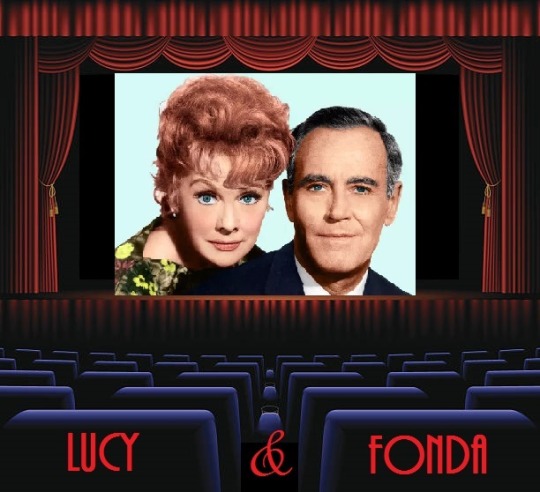
[For Part One - Please Click Here!]

“The Dean Martin Celebrity Roast: Lucille Ball” (February 7, 1975)
Director: Greg Garrison
Writers: Harry Crane, George Bloom, Tom Tenowich, Milt Rosen, Don Hinkley, Peter Gallay, Stan Burns, and Mike Marmer
Starring: Lucille Ball, Henry Fonda, Dean Martin, Ginger Rogers, Gale Gordon, Vivian Vance, Bob Hope, Jack Benny, Milton Berle, Gary Morton, Don Rickles, Rich Little, Foster Brooks, Nipsey Russell, Phyllis Diller, Dick Martin, Dan Rowan, Ruth Buzzi
TRIVIA
Lucille Ball is visible excited to hear that Fonda is roasting her. He tells the story of how he and Lucy dated when she first arrived in Hollywood. Public speaking and comedy where not Fonda's forte, but he delivers the material sincerely.
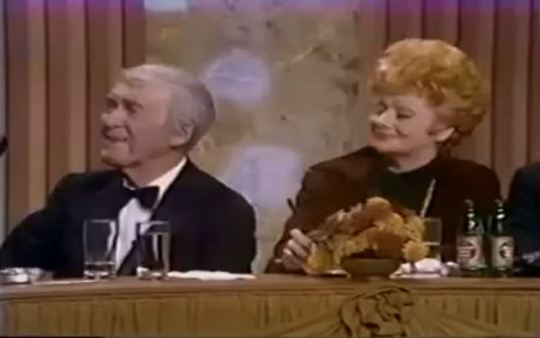
“The Dean Martin Celebrity Roast: Jimmy Stewart” (May 10, 1978)
Producers: Greg Garrison, Lee Hale
Director: Greg Garrison
Writers: Harry Crane, Stan Burns, David Axelrod, Jay Burton, Robert L. Mills, Mel Chase, Arthur Phillips, Martin Ragaway, Sol Weinstein, Howard Albrecht, Jack Shea, Larry Markes
Starring: Lucille Ball, Henry Fonda, Dean Martin, James Stewart, June Allyson, Greer Garson, Red Buttons, Barry Goldwater, LaWanda Page, Eddie Albert, Foster Brooks, George Burns, Tony Randall, Don Rickles, Janet Leigh, Rich Little, Milton Berle, Jesse White, Orson Welles, Mickey Rooney, Ruth Buzzi
TRIVIA
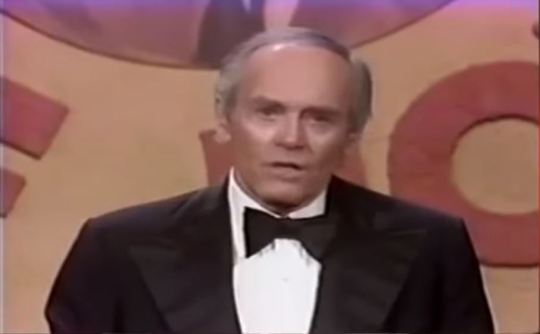
Henry Fonda talks about the films they did together. Fonda introduces and narrates film clips of Stewart's career. Henry Fonda and Stewart first worked together on the film On Our Merry Way (1948). They also collaborated on How The West Was Won (1962), Firecreek (1968), and The Cheyenne Social Club (1970). The were frequently seen on TV awards shows and tributes.
Lucille Ball and Jimmy Stewart never appeared together in a dramatic context. They often were guests on the same awards shows, tributes, and talk shows. The first was “Hedda Hopper's Hollywood” (1960) and the last was Lucille Ball's final public appearance on “The 61st Annual Academy Awards” (1989).
Fonda, Ball, and Stewart, were all neighbors in Beverly Hills. Lucy talks about his vegetable garden, a subject she has mentioned on other programs. Lucy jokes about what a respectful neighbor he is. She also ribs Stewart about his somewhat prudish reputation.
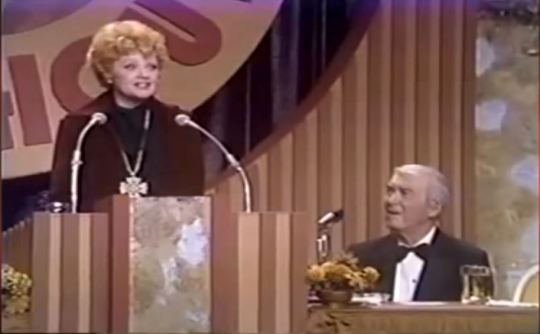
Lucy: “Next to Jimmy Stewart, Fred MacMurray is electrifying!”
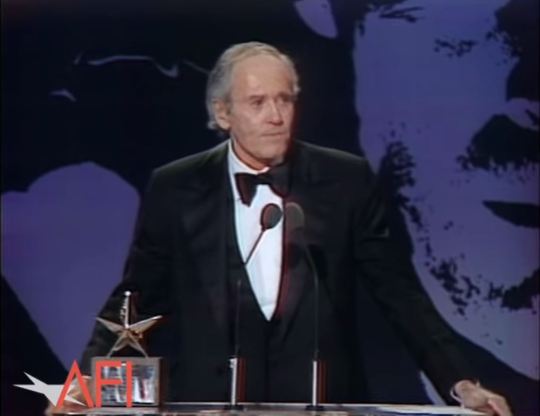
“AFI Life Achievement Award: Henry Fonda” (March 15, 1978)
Producers: Eric Lieber, George Stevens Jr.
Director: Marty Pasetta
Writer: Hal Kanter
Starring: Henry Fonda, Lucille Ball, Jane Alexander, Richard Burton, Bette Davis, Kirk Douglas, Jane Fonda, Peter Fonda, James Garner, Lillian Gish, Charlton Heston, Ron Howard, Jack Lemmon, Fred MacMurray, Marsha Mason, Dorothy McGuire, Lloyd Nolan, Gregory Peck, Barbara Stanwyck, James Stewart, Richard Widmark, Billy Dee Williams
TRIVIA
The American Film Institue (AFI) is an organization that educates filmmakers and honors the heritage of the motion picture arts in the United States. It was founded in 1965 by a mandate from President Lyndon Johnson. Their annual life achievement award began in 1973 and was awarded to John Ford. The ceremony that honored Henry Fonda was the first and only one not to have a host / presenter.
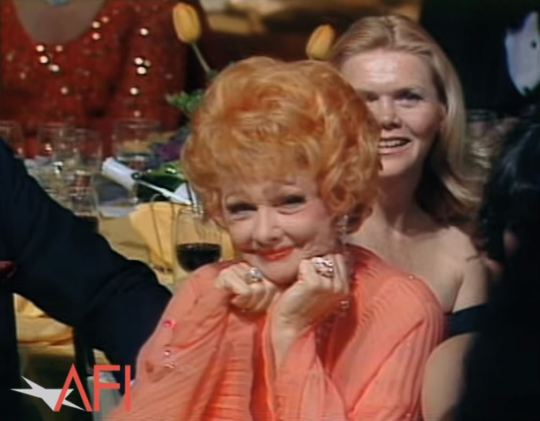
Henry Fonda: “I dated Lucy once. I guess you could say I didn't really plight my troth. I cry myself asleep a lot because if I had plighted by troth properly, they might've changed the name of that studio to Henrylu.”
Lucy's daughter, Lucie Arnaz, and her husband, Gary Morton, sit next to her in the audience.
Film clips from two out of three film collaborations with Lucille Ball, The Big Street (1943) and Yours, Mine and Ours (1960), are included.

“General Electric's All-Star Anniversary” (September 29, 1978)
Director: Dick McDonough
Writers: Monty Aidem, Jeffrey Barron, Bob Howard, Paul Keyes
Cast: John Wayne (Host), Lucille Ball, Henry Fonda, Albert Brooks, Alex Haley, Pat Hingle (as Thomas Edison), Bob Hope, Cheryl Ladd, Michael Landon, Penny Marshall, Denise McKenna, Donny Osmond, Marie Osmond, Charlie Pride, John Ritter, Red Skelton (as Old Man Watching a Parade), Suzanne Somers, Jimmy Stewart (as Mark Twain), Elizabeth Taylor, Leslie Uggams, Jimmie Walker, James Whitmore (as Will Rogers), Cindy Williams, Henry Winkler, Sha-Na-Na
Synopsis: John Wayne hosts this 90-minute ABC variety show. He gives a capsulized running history of the past 100 years between musical numbers, vignettes, and vintage film clips. Leslie Uggams and the group Sha-Na-Na perform musical numbers and Albert Brooks does a routine about holding auditions to find a new national anthem.
TRIVIA
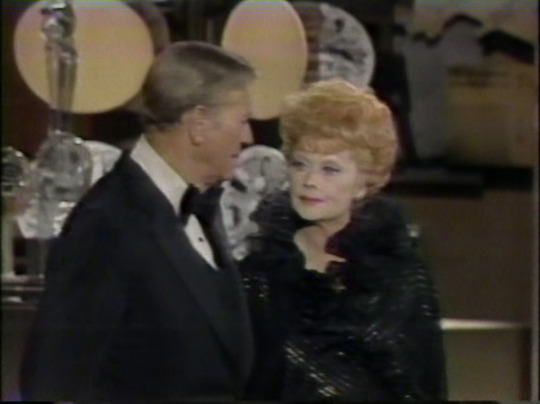
Although video of this special is scarce, photographs show Lucille Ball interacting with host John Wayne and performing a fast-paced dance number. There are no photos or other records of Henry Fonda's role in the celebration.
John Wayne also hosted a similar patriotic variety show, “Swing Out, Sweet Land,” in 1971. Lucille Ball did a serious monologue as the internal voice of the Statue of Liberty. Bob Hope and Leslie Uggams were also involved in both shows. Mark Twain was a character in both.

This special was ostensibly to mark the General Electric Corporation's (GE) 100th Anniversary, which came as a surprise to many as it had just celebrated its 75th Anniversary in 1970! Although the company was formed in 1895 by the merger of several smaller companies, GE eventually decided that its Anniversary should be marked by the day Thomas Edison himself formed the company in 1878. This change was primarily for advertising purposes – and this special was one of those marketing strategies.
From 1953 to 1962, GE sponsored the anthology series “General Electric Theatre” which, like “I Love Lucy,” was aired on CBS. It was hosted by future US President Ronald Reagan. Henry Fonda played clown Emmett Kelly in “The Clown” aired on March 27, 1955.
In 1952, Lucille Ball was featured in a print ad campaign to promote GE Ultra-Vision television sets.
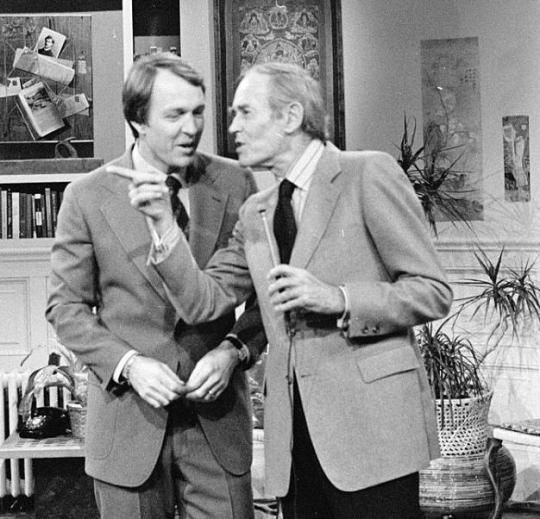
“America Alive!” (November 9, 1978)
“America Alive!” was a short-lived hour-long NBC daytime show which featured consumer tips, relationship advice, entertainment news and reviews, and comedy, from its home studio in New York City as well as remotes from Los Angeles.
Cast: Jack Linkletter (Host), Lucille Ball and Gary Morton (Co-Hosts), Henry Fonda (Guest)
TRIVIA
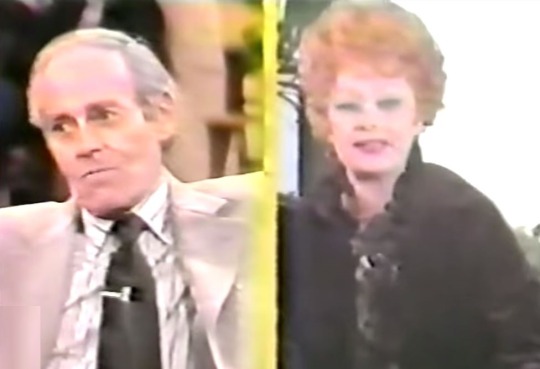
While Lucy and Gary were in a California studio, Lucy was supposed to interview Henry Fonda, who was in their studio in New York. The following day, host Jack Linkletter infers that it wasn't strictly an interview. Linkletter doesn't specify what happened and there are no video records of the interview.
The following day, Lucy spent the entire hour taking questions from an audience of students at UCLA.
“The 36th Annual Golden Globe Awards” (January 27, 1979)
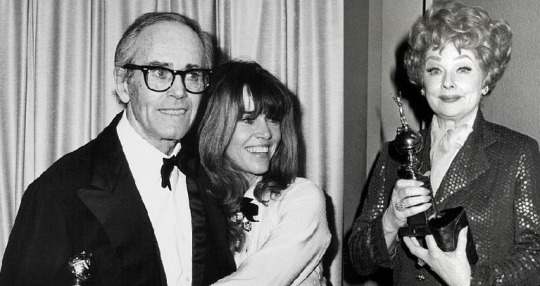
Lucille Ball was the recipient of the Cecil B. DeMille Award. Henry Fonda was in attendance to support his daughter, Jane Fonda, who won for Coming Home and received the Henrietta Award for World Film Favorite. Fonda was also a presenter.
SPEAKING OF HENRY....
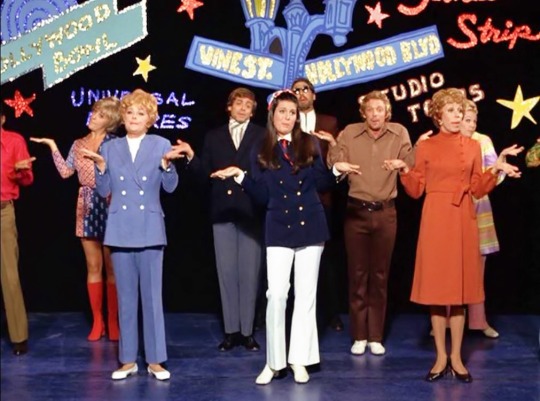
In 1971's “Lucy & Carol Burnett: The Hollywood Unemployment Follies” (HL S3;E22) the ensemble sings “Hooray for Hollywood” with specially-written lyrics that mention Henry Fonda and his children Jane and Peter.
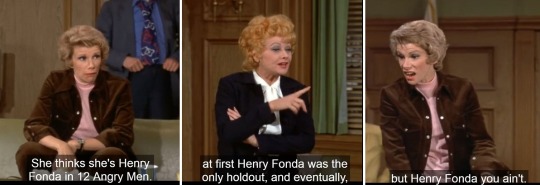
In 1973's “Lucy and Joan Rivers Do Jury Duty” (HL S6;E9), Lucy and Joan are on a deadlocked jury they compare to the film Twelve Angry Men (1957) starring Henry Fonda as the holdout juror.
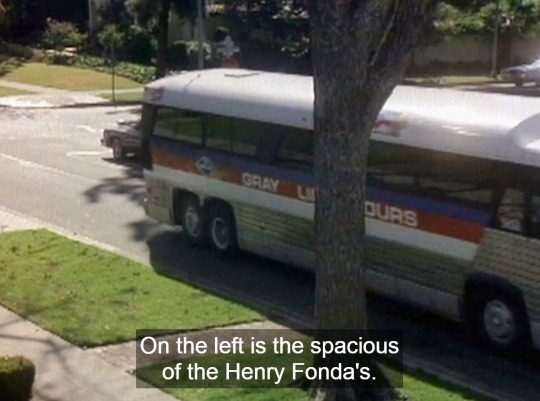
“Lucy Moves to NBC” (February 8, 1980) kicks off with a tour bus driving through Beverly Hills and the tour guide's voice announcing the homes they are driving past, including the Henry Fonda’s. When the bus reaches Lucille Ball's Roxbury Drive mansion, Lucy gets out of the bus – having hitched a ride from after her downtown shopping trip. In real life, the Arnaz family actually did live in the same neighborhood as Henry and Shirlee Fonda as well as James and Gloria Stewart and Jack Benny and Mary Livingstone.
Henry Fonda died in 1982.
Shirlee Fonda: "She [Lucy] was always calling or coming over to see him when he was ill. And after he died, she was one of the ones who always included me in social gathering. When I gave that first party after Henry's death, I said, 'Lucy, you have to be there and help me get though this.' And she was there for me, for 100%"
Lucille Ball died in 1989.

#Lucille Ball#Lucy#Henry Fonda#The Dean Martin Celebrity Roast#Jimmy Stewart#AFI#Golden Globe Awards#General Electric#America Alive!#Carol Burnett#Jane Fonda#Lucy Moves to NBC#Here's Lucy#Joan Rivers#Lucie Arnaz#Gary Morton#John Wayne
9 notes
·
View notes
Text
Hogwarts Houses Of Classic Disney Channel Characters | ScreenRant
Though Walt Disney founded his company in California in 1923, it would be another sixty years before a television network named for him debuted. In April 1983, the Disney Channel launched. In its original programming were animated series, The Mickey Mouse Club, and a handful of shows created for its new audience. The classic Disney Channel programming featured just as many dramas as comedies and didn’t make its foray into sitcoms until the late '90s.
RELATED: Hogwarts Houses Of 10 Disney Heroes From The 90s
Classic Disney Channel references the era before Hannah Montana reigned supreme over its programming. Before Hannah Montana launched in 2006, the network aired a lot of content acquired from other networks in addition to its shows created specifically for a Disney audience. If some of those classic characters found their way into Harry Potter’s Hogwarts, where would they end up?
10 Mickey Mouse: Gryffindor
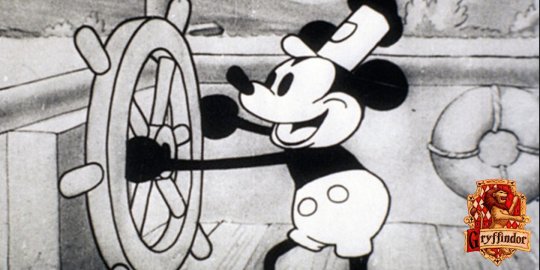
Though the many shows featuring Mickey Mouse were mostly pulled from other networks, there’s no denying he was a Disney Channel fixture. His silhouette is still a symbol for the network today. Without Mickey, the Mickey Mouse Club would never have united, after all.
As the de facto leader of the animated characters in their many incarnations, and his tendency to lead with his heart instead of his head, Mickey has to make his home in Gryffindor. Always ready for a new challenge, even if it would scare lesser mice, Mickey’s certainly a brave character.
9 Ren Stevens (Even Stevens): Ravenclaw

Before Disney Channel series focused on singers, dancers, and wizards, they focused on the everyday life of families. The Stevens family were at the center of Even Stevens, specifically Ren and her little brother Louis. While Louis was a reckless schemer, Ren was methodical and focused.
Ren was certainly ambitious, but most of her ambitions lay in her academic challenges. She relished in reports, charts, and writing, ready to learn as much as she could to prove herself the best student. Ren would be right at home solving riddles to get into the Ravenclaw common room.
8 Becca Fisher (Flash Forward): Hufflepuff

It would be difficult to have a list featuring classic Disney Channel characters without including one from the first series produced specifically for the network. Though other shows aired on Disney before 1996, the other series were created for networks like CBS and ABC. Flash Forward aired on ABC as well, but it started on Disney Channel with best friends Tucker and Becca.
Becca had known Tucker since birth, and despite a lot of his scheming that could get them into trouble, she stuck by him all through middle school. She tried her best to not only keep him out of trouble but also to minimize the damage of his schemes. Becca was also all about fairness, arguing for her friend Christine’s right to be part of the wrestling team. She was definitely a Hufflepuff.
7 Jett Jackson (The Famous Jett Jackson): Gryffindor

Before Austin and Ally, Hannah Montana, or the Jonas Brothers were big names for the network, their celebrity was Jett Jackson. An action star who returned to his hometown to work, Jett couldn’t escape the celebrity life. As a Gryffindor, he probably wouldn’t really want to.
Jett often protested that he wanted a normal life. His frequent use of celebrity to get himself out of trouble proved that untrue. He was willing to take big risks and was always willing to save the day. He even managed to get Britney Spears to show up for one of his school events!
RELATED: The Best Animated Disney Parents, Ranked
6 Zack Morris (Good Morning, Miss Bliss): Slytherin

Not many Saved By The Bell fans realize that the series didn’t start as a Saturday morning sitcom on a regular network. Its first incarnation was as Good Morning, Miss Bliss, with Zack Morris and friends in junior high on the Disney Channel.
Anyone who knows their Saved By The Bell knows that Zack is one mischievous kid who always wanted a shortcut. That’s typical of a Slytherin. Zack wanted to date the prettiest, most popular girl in school, coast through his classes, and do anything to make himself look better. He had a good heart, but couldn’t resist stirring up a little trouble in his favor.
5 Annie Thelen (So Weird): Ravenclaw

In So Weird, the daughter of a musician had an obsession with the supernatural. She investigated the unexplained as they toured. In season three, however, Fiona (Cara DiLizia) left the series for a normal life. Annie Thelen (Canadian actor/musician Alexz Johnson) joined the show.
Like Fi before her, Annie had a curious mind. Annie wouldn’t let go of any mystery put in front of her. She tracked down clues, researched mysterious phenomena, and even opened up unexplained instances in her own past. Both series leads were definitely Ravenclaws.
4 Mary Anne Spier (The Baby-Sitters Club): Hufflepuff

The Baby-Sitters Club will soon be reinvented for Netflix, but in the '90s, reruns of the 13-episode series aired on the Disney Channel after being developed for HBO. Inspired by a series of novels, the show featured a group of teenagers who started their own babysitting business. Mary Anne was the club secretary and the shyest among them.
She was also a peacemaker, frequently reminding her arguing friends about just what needed to be done. Her organizational skills kept the group on track, and her can-do attitude meant she was always ready to help in a crisis. She certainly fit the Hufflepuff mold.
RELATED: The 10 Best Disney Channel Movies, Ranked
3 Lizzie McGuire (Lizzie McGuire): Slytherin

With Lizzie’s sunny, but dramatic disposition, she might have seemed like a lock for Hufflepuff or Gryffindor. Lizzie, however, isn’t actually the most loyal of friends. She’s also always looking for a way to come out on top, which means she’s sorted into Slytherin.
Lizzie’s ambitions, whether it was being named best dressed in the middle school yearbook or getting to play a pop star for the day, often led her to forget everyone else around her. She also turned her back on her friend Miranda when Miranda was accused of shoplifting. Lizzie had a good heart, but sometimes her own desires meant she wasn’t the best friend.
2 Phil Diffy (Phil Of The Future): Ravenclaw

It’s very tempting to sort Phil Diffy into Gryffindor. When his time-traveling family ended up stuck in the past, he bravely faced life as an adventure. Of his family, however, Phil seemed to be the most knowledgeable of the past. That is why he’s better suited to Ravenclaw.
Surprisingly, Phil was able to slip right into the public school system and act like an average student. That comes from him studying up on the time period his family planned part of their vacation in. Phil was a quick study. He even understood most of the complicated mechanics of fixing their machinery that his dad spent the entire series working on.
1 Raven Baxter (That’s So Raven): Gryffindor
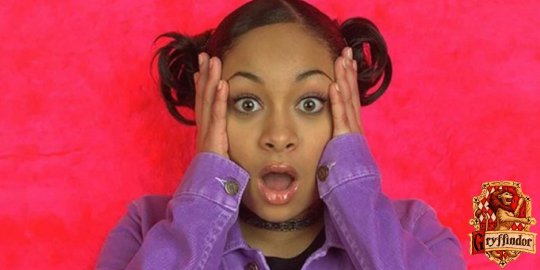
Raven Baxter is a bit of a schemer. Yes, she got herself into a lot of scrapes as a teenager, but her duplicity in those situations wasn’t born from a Slytherin attitude. She wanted to help. That’s why she’s a Gryffindor.
With a gift for psychic visions, Raven couldn’t help the things she saw. Unfortunately, since her visions were always quick and came in bits and pieces, she never had the full picture. Her tendency to jump in head first with only the smallest bit of information is just like a Gryffindor jumping to conclusions. She tried to help time and time again, and mostly, she succeeded.
NEXT: Hogwarts Houses Of 10 Disney Princesses From The 90s
source https://screenrant.com/classic-disney-channel-characters-hogwarts-houses/
1 note
·
View note
Photo

New Audiobook has been published on http://www.audiobook.pw/audiobook/photo-finish-a-jack-doyle-mystery/
Photo Finish: A Jack Doyle Mystery
Jack Doyle, former advertising man, amateur boxer, and Chicago racetrack publicist, undertakes a new job in the world of Thoroughbred horse racing: jockey agent. His client is Mickey Sheehan, a seventeen-year-old female riding phenomenon from Ireland, who has decided to try her luck in the States. She and Doyle prove an effective team, until someone secretly begins administering dangerous illegal medications to horses. In his quest to identify the culprit, the shrewd, irreverent, and always opinionated Doyle gets help from his friends Moe Kellman, furrier to the Mob, trainer Ralph Tenuta, himself the target of a blackmailer, and young veterinarian Ingrid McGuire, a greatly talented horse communicator. Meanwhile, Jack and Moe become co-owners of a promising, bargain-priced horse named Plotkin, who provides several thrills, not all of them welcome. Then as Plotkin is entered in a big race, the million-dollar Heartland Downs Futurity, the sibling rivalry between Mickey and her occasionally race-manipulating brother Kieran, one of Ireland’s top jockeys, flares up and comes to a climax with Mickey aboard Plotkin. From Chicago’s Heartland Downs racetrack to New York’s famed Saratoga Race Course, Doyle is detoured to Mob chieftain Fifi Bonadio’s lavish yacht in Chicago’s Belmont Harbor. Will the favor he agrees to do for Fifi get him killed, or will it be his persistent push for answers to the horse doping? As an amateur investigator in the world of American racing, Doyle is sometimes mistaken but always dogged in his search for answers. The challenges he faces in attempting to halt the horse drugging and the threat to Tenuta’s life are the most daunting of his colorful career. McEvoy’s solid fifth Jack Doyle mystery…The author, a former Midwest editor and senior correspondent for Daily Racing Form, writes convincingly about the turf.-Publishers Weekly
0 notes
Text
LARGER THAN LIFE

In 1927, Albert Bertanzetti and his three-year-old son, William, were taking a stroll when they stopped to join a small crowd watching a film being shot on the streets of Los Angeles. During a break in the shoot, Albert suggested his son go show the director, Jules White, his little trick. So William toddled over to White and tugged on his pant leg. When he had White’s attention, William flipped over, went into a headstand and began spinning in circles. White was so taken with the trick he gave the young Bertanzetti a small uncredited role in the two-reel short, Wedded Blisters. Afterward, William earned a regular role in the popular Mickey McGuire series of shorts, where he played Mickey Rooney’s younger brother Billy. Taking prevailing anti-Italian sentiments into consideration, in the credits he was cited as “Billy Barty.”
Barty had been born in Millsboro, Pennsylvania in 1924, but when it was determined he had hay fever, Albert decided to move the family West, to the dry, clean air of Hollywood. Depending on how you look at it, hay fever was the least of Barty’s problems. Or maybe not, given how things worked out.
Apart from hay fever, Barty had also been born with cartilage–hair hypoplasia, a form of dwarfism. Being extremely small for his age at three (as an adult he stood three-foot-nine), when it came to early film roles he was almost exclusively relegated to playing diaper clad infants. It was a director’s dream—having an infant on set who could not only take direction, but could walk, run, talk and do tricks as well. As a result, along with the Mickey McGuire shorts, he played infants in everything from the all-star live action adaptation of Alice in Wonderland (1933) to Golddiggers of 1933 (1933) to Bride of Frankenstein (1935). In fact Barty, tiny as he was, would play diaper-clad infants until he hit puberty.
Over a career that would span seven decades, along with infants, Barty would play his share of elves, leprechauns, imps, Hobbits, trolls, assorted other fairy tale and fantasy characters, clowns, court jesters, pygmies, sideshow performers and mad scientist assistants. Ironically, for having appeared in over two hundred films and television shows, Barty did not appear in the three touchstones of American Dwarf-centric cinema: Tod Browning’s Freaks (1932), Sam Newfield’s The Terror of Tiny Town (1938), or Mervin LeRoy’s The Wizard of Oz (1939). No, although he would appear in the behind-the-scenes comedy Under the Rainbow (1981), contrary to the general assumption, Billy Barty was never an original Munchkin. There are reasons for this.
In 1932 when Browning was working on Freaks, Barty was only eight, he was not a professional carnival freak, and he was too busy with the Mickey McGuire shorts. And after the shorts’ seven-year run ended in 1934—two years before casting began on Tiny Town or The Wizard of Oz—Albert Bertanzetti, recognizing talent in all of his children, pulled Billy out of the movies and sent the whole family on the vaudeville circuit.
Now, 1935 was hardly the most opportune time to try and break into vaudeville. As an entertainment form it had been on life support for a decade already, with theaters either closing down or becoming movie palaces with performances, almost as a sad afterthought, taking place after that evening’s double feature had ended. Those performers who could were trying to break into pictures, and those who couldn’t were vanishing without a trace. Now here was Barty, who’d been working regularly in films for nearly ten years, trying to break into vaudeville. Nevertheless, Billy and Sisters, as they were touted, marched on, with a musical act featuring Barty’s sister Evelyn on piano and accordion, his other sister Dede playing violin, and Barty himself on drums. They all sang and danced a little, and the adolescent Barty told jokes and did impressions. In his later years he remembered the time fondly, mostly because it gave him a chance at that early age to see much of North America.
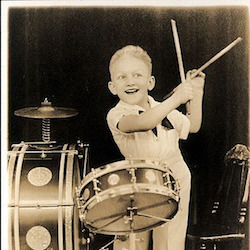
In 1942 Barty enrolled in college in Los Angeles and majored in journalism, hoping to become a sportswriter. While there, he joined the football and basketball teams, where he was both a novelty and a ringer. He also played second base on a semi-professional baseball team for a spell, where by his own account he was walked forty-five times.
Instead of pursuing work as a sports columnist after graduation, he returned to show business. Later he was quoted as saying, “You don't see any little people doing newscasts, you don't see any doing sports writing, you don't see any sports announcing, you don't see any coaches, but there are little people who are capable of doing these things, who have proven themselves.” You get the sense there was a little personal bitterness there, hinting he may have been forced back to Hollywood because that was the only place he could find work.
By 1947, now an adult with a gravelly but high-pitched voice, Barty sported a boxer’s face on a disproportionately large head. In many ways he resembled a diminutive William Demarest, and in many roles would adopt Demarest’s gruff but lovable demeanor. Shedding the diaper at last, he nevertheless picked up where he left off, playing assorted pygmies and leprechauns and elves, usually for cheap laughs.
In the early Fifties he became a regular member of Spike Jones musical comedy ensemble, The City Slickers, and was a big hit on Jones TV shows, where he became especially known for his slapstick, spot-on Liberace impression, and his ability to roll off his piano bench into a head spin, a trick which continued to serve him well.
Growing up, Barty said, he had no idea he was different, that his parents never told him there were things he couldn’t do because he was too short. By the time he was thirty, however, he’d come to learn the rest of the world was not quite as accepting as his parents. In 1957, Barty put out a call for little people from around the country to join him for a get together in Reno. Only twenty people showed up to that first convention, but it became the foundation for Little People of America, a support and advocacy group pushing for equitable treatment and civil rights for dwarfs, midgets and other people of unusually small stature. His aim was to ensure little people across the country would be treated fairly, would be able to get jobs, and would be granted the same accessibility rights afforded the normally-sized. It always struck me as a little odd that, for all his tireless efforts lobbying to normalize perceptions and treatment of little people throughout American culture, Barty, without much apparent gumption, would continue to take roles some might call demeaning, or at the very least helped cement those stereotypes he was fighting so hard to break. Perhaps to him it was simply paying work, it was showbiz, and he knew full well what his role was within that world. But the apparent ironic contrast between his activism and his work would lead to a public tiff in the Seventies with fellow small actor Hervé Villechaize of Fantasy Island. Barty, who’d appeared on the show, felt Villechaize was undercutting all his work when he said bluntly that people like him and Barty “were midgets, not actors.”
After the second annual Little People of America convention, Barty began courting Shirley Bolingbroke, a little person who had attended the meeting. When he proposed, however, she declined, telling him she was a devout Mormon, and so would never consider marrying anyone outside the faith. In 1962 Barty relented and converted to the church of Latter-day Saints, and the two were married. Although Mormon insiders and publicists have made a big deal of Barty’s enthusiastic True Believer status within LDS, it would be many years before he agreed to get baptized and receive full member status, and then only to participate in his son’s baptism.
Around the time of the marriage, as Barty was making regular TV appearances on various comedy and variety shows (including a recurring role on Peter Gunn), he also began hosting a weekday afternoon local kid’s show in Los Angeles which was called either Billy Barty’s Big Top or Billy Barty’s Big Show, depending on who’s doing the remembering. That stint may well have brought him to the attention of the sinister Sid and Marty Krofft, who in the late Sixties conscripted Barty to become a regular on several Krofft shows including H.R. Pufnstuf, The Bugaloos, and later Sigmund The Sea Monster, where he played the titular sea monster opposite Rip Taylor and aging child star Johnny Whittaker.
For all the low-brow antics and his uncredited roles in Elvis movies, it must be said Barty was always a compelling and charismatic screen presence, a, yes, larger than life character. In those few rare instances when he played roles that made no references at all to his height—like Abe Kusich, the shady drunken cockfighter in Day of the Locust or Ludwig, Rod Steiger’s sidekick in W.C. Fields and Me, he proved himself an electric onscreen presence who could dominate any scene.
(Just a quick aside, in 1980 Ralph Bakshi rotoscoped Barty to portray both Bilbo and Samwise Baggins in his animated version of Lord of the Rings. I wasn’t aware of that at the time, but thinking back on it now, the way both characters moved, it seems so obvious I was watching another Billy Barty performance.)
In 1975, around the same time he opened a Southern California roller rink he called “Billy Barty’s Roller Fantasy, Barty established The Billy Barty Foundation. As an adjunct to Little People of America, the Foundation aimed to provide practical assistance—money, adaptive equipment, etc.—to little people in need, particularly children. And after campaigning for George H.W. Bush during the 1988 presidential campaign, he sat on a panel of advisors working to hammer out the details of the Americans with Disabilities Act, which President Bush signed into law in 1990.
At the same time he was sitting on that panel, Barty was also producing, directing and starring in Short Ribs, a syndicated sketch comedy series featuring an all-dwarf cast including Patty Maloney, Jimmy Briscoe and Joe Gieb. The show, which was modeled after SCTV and SNL, only aired in the Los Angeles area and ran thirteen weeks. After the show went off the air, Barty was slapped with two lawsuits, one from the show’s co-producer William Winckler and one from the show’s co-writer Warren Taylor, both of whom claimed Barty owed them money. The suits ended up, inevitably, in small claims court. Barty lost both suits, and even though few people had ever heard of, let alone seen the show, news of Barty in small claims court was too much for reporters to resist, and the case received smirking national attention.
After the suits were settled, Barty continued to work, but a bit more sporadically. He had one-off roles on Frasier, Jack’s Place, and a few low-budget quickies, and seemed to be edging more into voice roles, providing characterizations for a Batman cartoon and The Rescuers Down Under, to name a couple. But he was still working until the end, when he ended up in the hospital with cardiopulmonary issues in late 2000. He died on December 23rd of that year at age 73.
In the late Eighties he told an interviewer, “I’ve never looked at acting as ‘Ahhh!’ and ‘Gee!’ I started in vaudeville when I was five and for me it was just walking on a stage and I'm gonna perform. Later on I was impressed by many things, like when I worked with Burt Lancaster and Kirk Douglas in Tough Guys. That was an ‘Ahhh!’ for me. When I look back, even today, I guess I can go ‘Ahhh!’ because I worked with Ruby Keeler and Dick Powell in Gold Diggers of 1933 when I was nine. Then they were just grown-ups on the stage. As I look back, I'm more awed now than I was when I was actually doing it.”
Those who knew and worked with Barty always recall what a joy it was, how kind and enthusiastic and funny he was, a real spark who could enliven even the most questionable production. I would never deny that. I’ve always loved and admired Barty, and have sat through countless godawful films and TV shows simply because he had a role, no matter how small.
That said, I do have to wonder if at the end, after all his decades of work fighting for the dignity of little people everywhere, he felt like a bit of a hypocrite for spending those same years and more cementing the stereotype in the American consciousness. I also wonder if he died still wishing he’d become a sportswriter for a Des Moines daily instead.
by Jim Knipfel
5 notes
·
View notes
Text
Lucy Meets Mickey Rooney
S4;E18~ January 24, 1966


Synopsis
Mickey Rooney takes out a loan from Mr. Mooney's bank to open an acting school. Lucy and Mr. Mooney each wangle free acting lessons, which culminates in a silent movie sketch.
Regular Cast

Lucille Ball (Lucy Carmichael / 'The Little Tramp'), Gale Gordon (Theodore J. Mooney / 'Shopkeeper')
Mary Jane Croft (Mary Jane Lewis) does not appear in this episode.
Guest Cast

Mickey Rooney (Himself / 'The Kid') was born Joe Yule Jr. on September 23, 1920 in Brooklyn, New York. He first took the stage as a toddler in his parents vaudeville act at 17 months old. He made his first film appearance in 1926. The following year, he played the lead character in the first Mickey McGuire short film. It was in this popular film series that he took the stage name Mickey Rooney. He won a juvenile Oscar in 1934, which he shared with Deana Durbin. He was nominated four more times and received an honorary Oscar in 1983. He appeared with Lucille Ball in the 1943 film Thousands Cheer. Rooney was married eight times. He died in 2014 at the age of 93.
Dorothy Konrad (Acting Student / “Rich Woman') played Danfield volunteer firefighter Dorothy Boyer in several season one episodes and will appear just once more in the series.
George Barrows ('Prisoner') played a gorilla in his very first screen credit, Tarzan and His Mate (1934). He donned the gorilla suit 18 more times from 1954 to 1978. His final simian character was on “The Incredible Hulk.” His first appearance on “The Lucy Show” was also as a gorilla, in“Lucy and the Monsters” (S3;E18). This is the second of his 'human' characters on the series.

The Acting Students / 'Keystone Cops' are played by:
Jack Perkins was a stuntman and actor often cast for his ability to play drunk. He also has quite a few credits as a brawler and a bartender. He will appear in one more episode of “The Lucy Show.”
Fred Krone was a stuntman and actor. He was a lifetime member of the Stuntman's Association of Motion Pictures.
Harvey Parry was a stuntman and actor who appeared with Lucille Ball in two films in the 1930s. He will do one more episode of “The Lucy Show.”
Sid Gould made more than 45 appearances on “The Lucy Show,” all as background characters. He also did 40 episodes of “Here’s Lucy.” Gould (born Sydney Greenfader) was Lucille Ball’s cousin by marriage to Gary Morton. Gould was married to Vanda Barra, who also appeared on “The Lucy Show” starting in 1967, as well as on “Here’s Lucy.”

Three other female extras round out the acting class. A dog appears in the silent movie sketch.

This is the first and only episode written by Hugh Wedlock Jr. and Alan Manings.

The school Mickey Rooney wants to open is called The Players Showcase.

At the start of the episode, Mr. Mooney is asking Lucy for the Nicoletti file. Louis Nicoletti played bit parts on 20 episodes of “I Love Lucy.” His name was given to the Florence hotel manager in “Lucy is Homesick in Italy” (ILL S5;E22).
To extend the loan to Rooney, Mr. Mooney goes to check with Bank President Mr. Cheever. The character will not be seen for another year and will be played by Roy Roberts.

Lucy: “Mickey Rooney the actor?”
Mr. Mooney: “No, Mickey Rooney the plumber!”
In “Lucy and the Plumber” (S3;E2) the plumber looked just like an actor – Jack Benny.
When Lucy's lipstick smears across her cheek due to a sudden shock, Mr. Mooney says “You look like Geronimo!” Geronimo (1829-1909) was a prominent Native American warrior from the Apache tribe who led rebellions to protect his homeland. Mr. Mooney is referring to the 'Indian' war paint.
Mickey Rooney mentions his alimony payments. At the time this episode was filmed in late 1965, Rooney had been divorced four times. His fifth wife died just one week after this episode first aired. He re-married in September 1966 and would marry twice more before his death.

Mr. Mooney says to Lucy: “What in the name of Bette Davis makes you think you can act?” Bette Davis (1908-89) was a two-time Oscar winner who was nominated nine other times. She was slated to appear as “The Celebrity Next Door” on the “Lucy-Desi Comedy Hour” but withdrew at the last minute and was replaced by Tallulah Bankhead.
Lucy lists her school acting credits: Mr. Roberts (in a 1948 play of the same name), MacBeth (in Shakespeare's tragedy of the same name), Julius Caesar, and Captain Hook in Peter Pan. Apparently Lucy must have gone to an all-girls school since these are all male roles! She fails to mention her experience playing Cleopatra for the Danfield Community Players (S2;E1).

Praising Mickey Rooney, Lucy tells him “Those father and son talks with Judge Hardy helped a lot.” Lucy is referring to Rooney's portrayal of Andy Hardy in 16 films between 1937 and 1958. Lewis Stone (above left) played Andy's Judge father in all but one. In the first film the father was played by Lionel Barrymore.
While playing drunk during an improv, Rooney says to Lucy “What's new pussycat?” The expression was also the title of a 1965 film written by Woody Allen as well as its title song nominated for an Oscar in 1966.

In Rooney's acting class, Mr. Mooney rehearses Mark Antony's famous speech from Shakespeare's Julius Caesar: “Friends, Romans, countrymen, lend me your ears.” Vivian Vance played Mark Antony to Lucy's Cleopatra back in Danfield.

The underscoring to portions of the silent movie sketch is “Hello, Ma Baby,'” a song written by Ida Emerson and Joseph E. Howard in 1899. It is probably most associated with the singing and dancing frog in the 1955 Merrie Melodies cartoon short “One Froggy Evening.”
Callbacks!

The Charlie Chaplin silent movie skit Lucy does with Mooney and Rooney is reminiscent of the one she did with Vivian Vance in “Chris's New Year's Eve Party" (S1;E14).


An improv class gives Lucille Ball a chance to do her chicken imitation. She first walked like a chicken as Lucy Ricardo to lead 500 baby chicks back into their boxes in “Lucy Raises Chickens” (ILL S6;E19).
Blooper Alerts
Cuts! There are obvious edits in the office scene, perhaps for time.

Hays Press! When Lucy is nailing up the Theatre Guide poster on the studio wall, one of the ads has the word 'Palace' in the same font found in the newspaper in “Lucy, the Rain Goddess” (S4;E15) and “Ricky’s Old Girlfriend” (ILL S3;E12) in 1953! Most Hollywood prop newspapers were printed by the same company: the Hays Press.

Speilling! The sign above the silent movie sketch grocery store say “Market Low Prices on Meat's” - with a possessive apostrophe.

“Lucy Meets Mickey Rooney” rates 4 Paper Hearts out of 5

#The Lucy Show#Lucille Ball#Mickey Rooney#Gale Gordon#Sid Gould#Dorothy Konrad#George Barrows#Jack Perkins#Fred Krone#Harvey Parry#Charlie Chaplin#Silent Movie#Geronimo#Andy Hardy#Louis Nicoletti#Bette Davis#Julius Caesar#Improv#Lewis Stone#What's New Pussycat#Hello Ma Baby#Keystone Cops#The Kid
3 notes
·
View notes